The latest details about Russia’s attack on Ukraine:
Proposed aid for Ukraine grows beyond $12 billion in proposed spending deal
9:00 p.m. EST March 7
Proposed U.S. aid for Ukraine and its European allies has grown beyond $12 billion, Senate Majority Leader Chuck Schumer said Monday, as congressional bargainers worked toward a bipartisan government-wide spending deal that would also contain fresh sums for battling COVID-19.
The remarks by Schumer, D-N.Y., underscored the momentum in Congress for helping outgunned Ukraine fend off Russian invaders and assisting that country and others cope with refugees and other economic and humanitarian problems caused by the brutal attack.
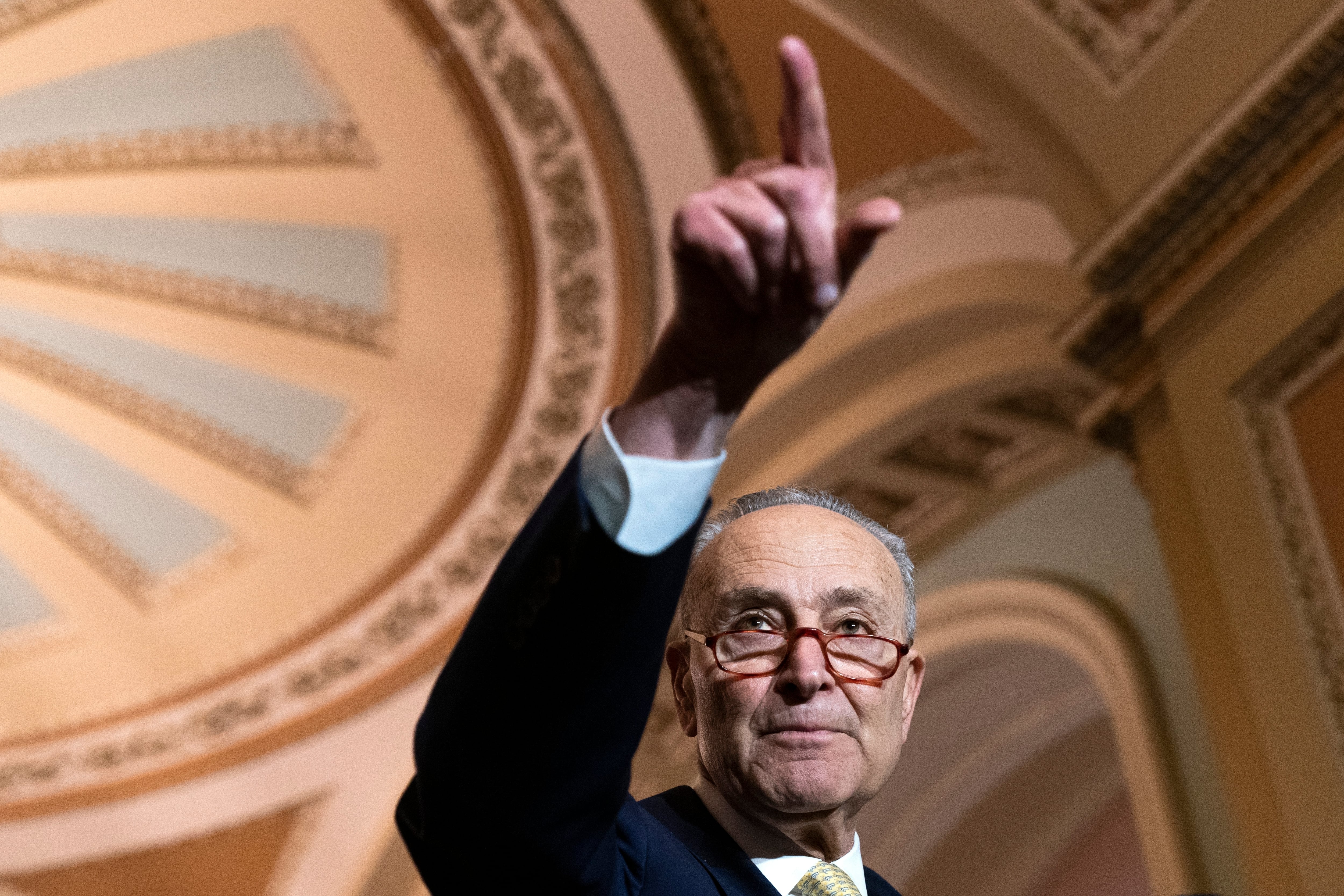
“The clearest signal Congress can send to Vladimir Putin this week is passing a bipartisan aid package,” said Schumer, referring to the Russian president, “leaving no doubt that the democratic nations of the world stand with Ukraine and against Putin’s deeply immoral and bloody war.”
Schumer said the assistance would pay for refugees, medical and food supplies, weapons transfers to Ukraine and aid for nearby NATO allies.
The apparent growth of the Ukraine aid also illustrated eleventh-hour negotiations underway among lawmakers as they try completing the long overdue $1.5 trillion government spending measure by Friday. The legislation would increase spending for defense and domestic programs, though lawmakers haven’t said yet by how much.
Agencies have run on temporary authority since Oct. 1, when the government’s fiscal year began. That lapses this weekend, and an election-year federal shutdown would occur without more money.
Asked about the new $12 billion figure for Ukraine, No. 2 Senate Republican leader Sen. John Thune said he was aware of numbers “in that range.” Aides from both parties said the assistance was growing. Support for Ukraine has deep bipartisan support in Congress, and only last week President Joe Biden asked lawmakers for $10 billion to help the beleaguered country.
“There’s a real sense of urgency” about the Ukraine aid, Thune, R-S.D., told reporters. He said the strong backing for that assistance would benefit the overall $1.5 trillion legislation because it would “help keep this thing moving.”
RELATED
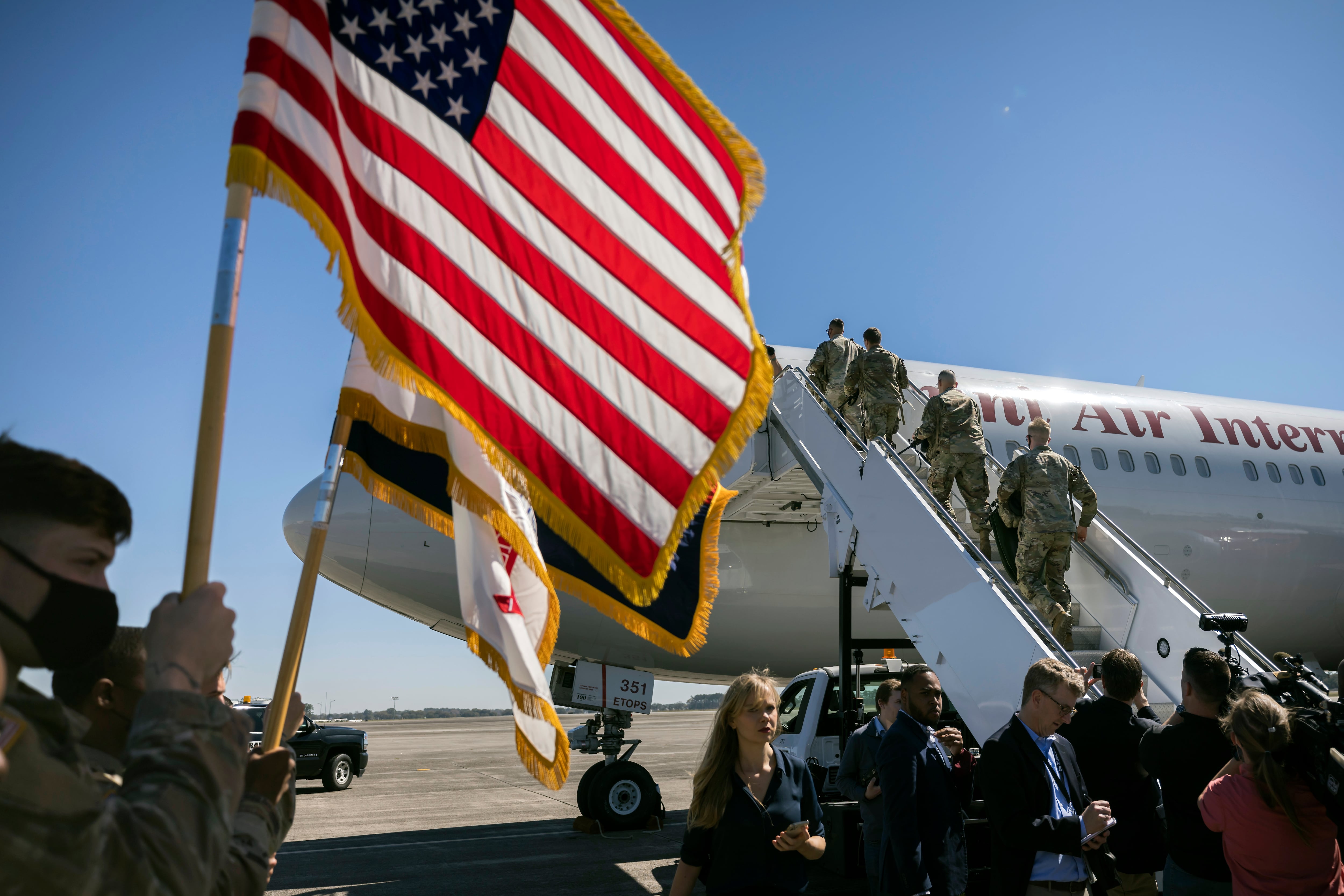
Biden also proposed another $22.5 billion to continue bolstering government efforts against the pandemic. Republicans have objected that such additional spending should come from unspent funds from previous COVID-19 relief bills Congress has enacted, which totaled over $5 trillion.
Thune said negotiators seemed ready to pay for pandemic expenditures with unspent COVID-19 money, and aides said talks were moving that way. They also said the $22.5 billion figure could fall, though that remained unclear.
If that happens, “in the end there ought to be a pretty big vote” for the overall bill, Thune said. “But we’ll see.”
Leaders want the House to vote on the legislation by Wednesday, when House Democrats plan to leave town for the rest of the week for a political retreat. That would give the Senate a couple of days to complete the measure before confronting a federal shutdown, which experience has shown angers voters and which both parties hope to avoid.
‘Frustrated’ Russian commanders increasing missile attacks, seeking Syrian recruits
4:30 p.m. EST March 7
As Russia’s advance into Ukraine has largely stalled out in the effort to take major cities, the Defense Department assesses that missiles and artillery are becoming a bigger part of the Russian strategy.
“What what we assess is as they continue to get frustrated, they continue to rely now more on what we would call long-range fires,” Pentagon spokesman John Kirby told reporters on Monday. “So this is bombardment, missile strikes, long-range artillery into city centers that they aren’t in yet, at least not on the ground in any significant number.”
As a result, Kirby added, the Pentagon confirmed that civilian casualties will likely increase, though he could not say whether attacks on residential areas are the result of targeting or miscalculation.
“As you would expect, when you’re relying more on long-range fires, you’re going to cause more damage and you’re going kill more people and injure more people, and so that’s what we’re that’s what we think is happening.”
The Pentagon also believes reports that Russia is actively trying to recruit Syrian fighters to join its troops are true.
“I can’t begin to speculate why he would find it necessary to to seek help from from foreign fighters,” Kirby said. “We do believe ... that they are having morale problems, they are having supply problems. They are having fuel problems. They are having food problems there.
Coupled with “stiff and determined Ukrainian resistance,” Kirby said, it’s likely that the Russian advance is several days behind where leaders planned to be at this point.
“But I can’t honestly I cannot get inside Mr. Putin’s brain as to why he would find it necessary to seek support from foreign fighters,” he said.
-Meghann Myers, Military Times
The Pentagon says it’s seen no Russian threats against supply routes yet
1:30 p.m. EST March 7
U.S. Deputy Secretary of State Wendy Sherman says that getting military material for Ukrainians to fight a Russian invasion is set to become more difficult for the U.S. and its allies.
“I think that the international community has been tremendously responsive and have found ways to get the material in. That may become harder in the coming days, and we’ll have to find other ways to manage this,” Sherman said Monday during a visit to the Spanish capital for meetings with officials.
The Biden administration is considering how to fulfill Ukrainian President Volodmyr Zelenskyy’s request for warplanes, the official said, considering that Ukrainians would only be able to operate soviet-era warplanes provided by Poland.
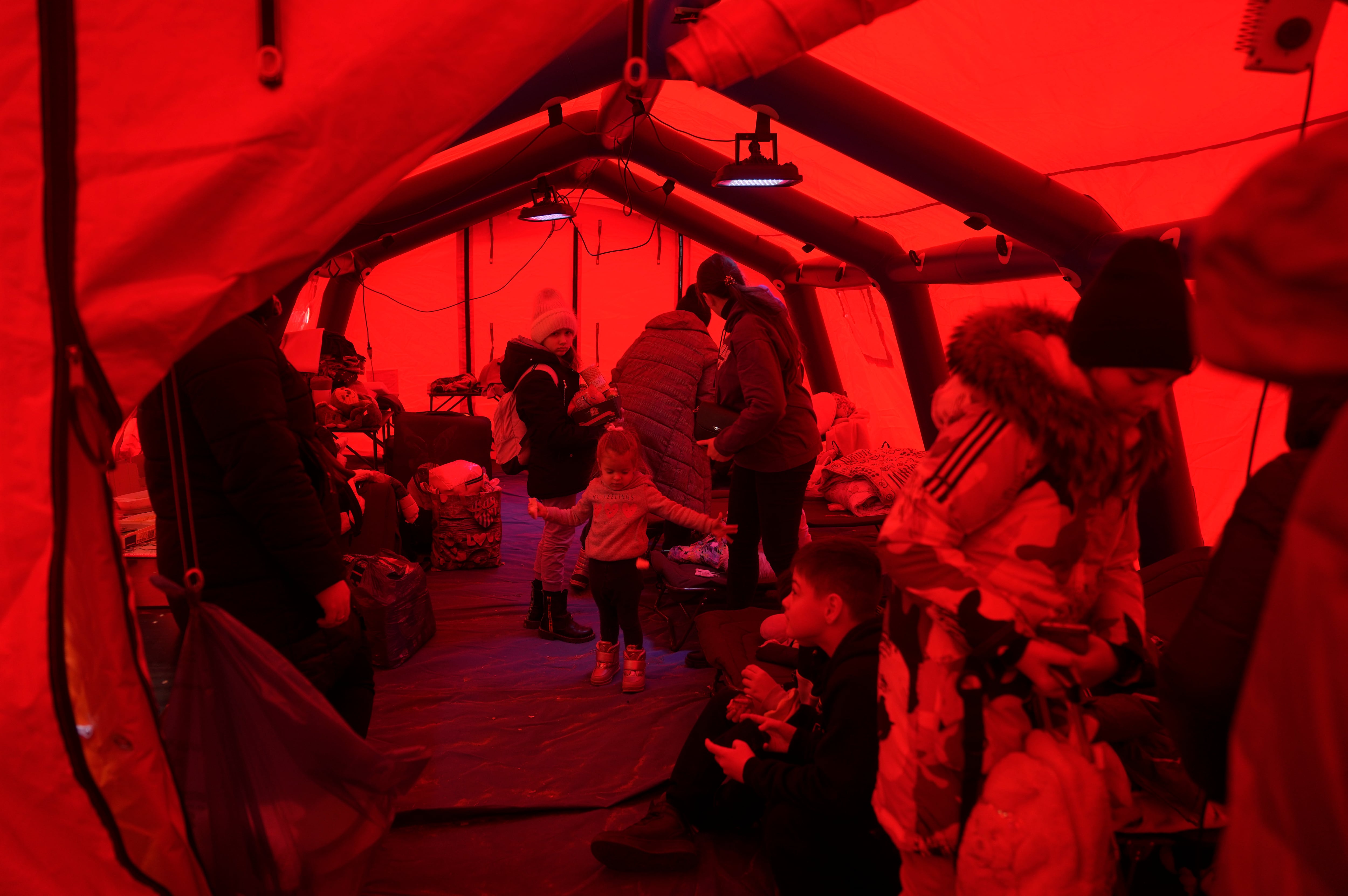
“People are trying to see whether this is possible and doable,” she said, adding that the warplanes should not be regarded by Moscow as direct involvement in the conflict: “We would expect that this delivery would be seen as all the deliveries have been seen as a right for Ukraine to defend itself.”
Sherman met in Madrid with Foreign Minister José Manuel Albares and other officials. She arrived from Turkey and was on her way to Morocco, Algeria and Egypt for a week of intense diplomatic contacts amid the war in Ukraine.
So far, however, those routes are still open, a senior U.S. defense official said Monday afternoon.
“We have certainly in recent days, continued to flow things into Ukraine,” said the official, speaking on condition of anonymity. “Not just us, but 14 other nations are doing the same thing.”
The shipments are “obviously moving on the ground,” said the official. “We haven’t seen those avenues closed or threatened.”
-Howard Altman, Military Times, contributed.
Proposed evacuation routes to Russia and Belarus drawing criticism
10:45 a.m. EST March 7
Russia announced yet another limited cease-fire and the establishment of safe corridors to allow civilians to flee some besieged Ukrainian cities Monday. But the evacuation routes led mostly to Russia and its ally Belarus, drawing withering criticism from Ukraine and others.
Ukrainian officials accused Moscow of resorting to “medieval siege” tactics in places, and in one of the most desperate of the encircled cities, the southern port of Mariupol, there were no immediate signs of an evacuation.
Russian President Vladimir Putin’s forces continued to pummel some cities with rockets even after the announcement of corridors, and fierce fighting raged in places, indicating there would be no wider cessation of hostilities.
Efforts to set up safe passage for civilians over the weekend fell apart amid continued shelling. But the Russian Defense Ministry announced a new push Monday, saying civilians would be allowed to leave the capital of Kyiv, Mariupol and the cities of Kharkiv and Sumy.
The two sides met for a third round of talks Monday, according to Russian state media, though hopes for any breakthrough were dim. The countries’ foreign ministers are also scheduled to meet in Turkey on Thursday, according to that country’s top diplomat.
Ukrainians, whose ferocious resistance has slowed the invasion and thwarted any hopes Moscow had for a lightning victory, have been reinforcing cities across the country.
In Kyiv, soldiers and volunteers have built hundreds of checkpoints, often using sandbags, stacked tires and spiked cables.
“Every house, every street, every checkpoint, we will fight to the death if necessary,” said Mayor Vitali Klitschko.
Dozens of makeshift kitchens are serving food to soldiers.
“I’m carrying out my duty, working for my country, thanking our soldiers,” Natalia Antonovska said at one kitchen. “That’s why I’m here, and I’m very proud of it.”
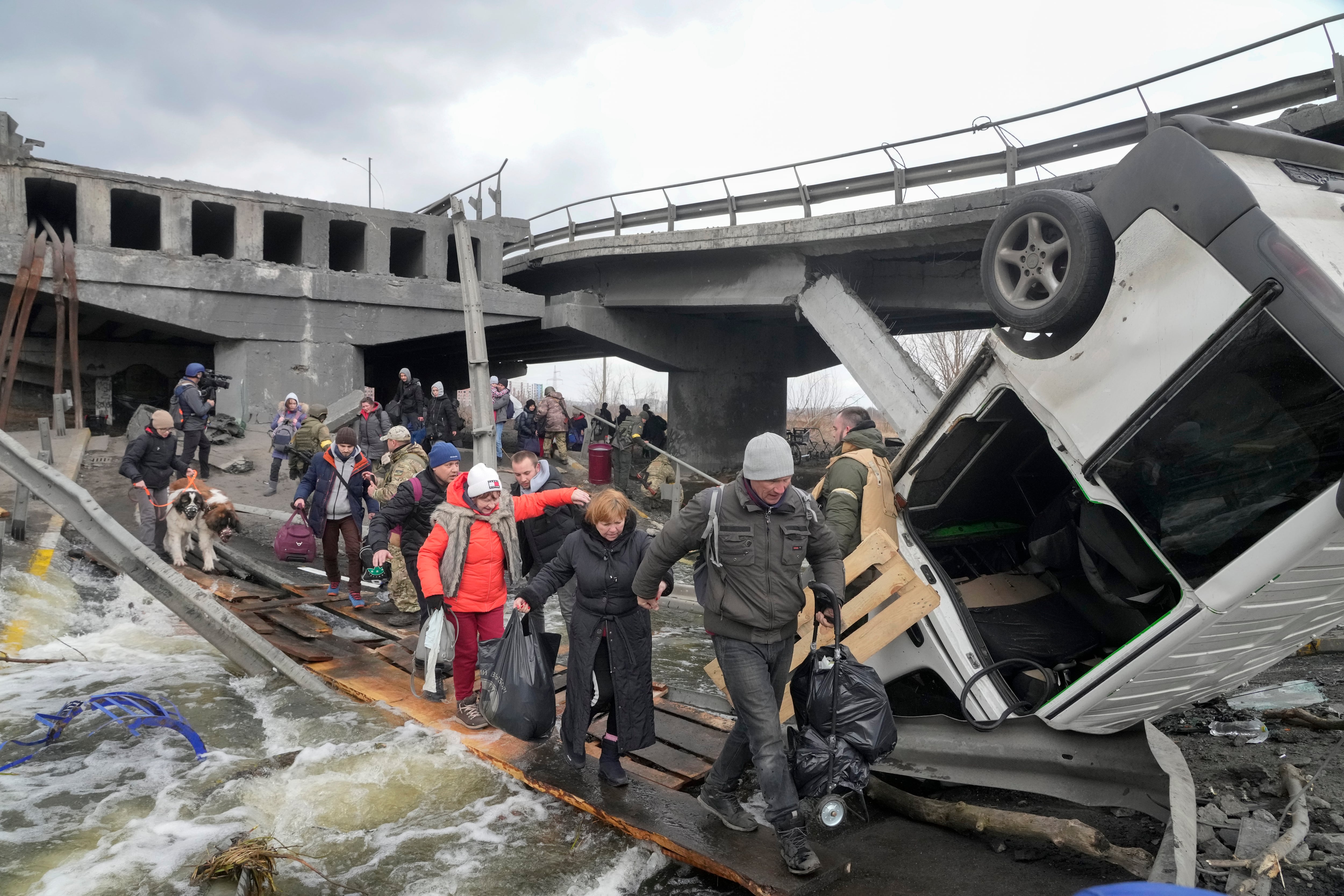
In Mariupol, where an estimated 200,000 people hoping to flee were becoming increasingly desperate, Red Cross officials waited to hear when a safe corridor would be established. The city is short on water, food and power, and cellphone networks are down. Stores have been looted as residents search for essential goods.
Police moved through the city, advising people to remain in shelters until they heard official messages broadcast over loudspeakers to evacuate.
Hospitals in Mariupol are facing desperate shortages of antibiotics and painkillers, and doctors performed some emergency procedures without them.
The lack of phone service left anxious citizens approaching strangers to ask if they knew relatives living in other parts of the city and whether they were safe.
At the International Court of Justice at The Hague, Netherlands, Ukraine pleaded for an order to halt Russia’s invasion, saying Moscow is committing widespread war crimes and “resorting to tactics reminiscent of medieval siege warfare.” Russia snubbed the proceedings, leaving its seats in the Great Hall of Justice empty.
Well into the second week of the war, Russian troops have made significant advances in southern Ukraine and along the coast, but other efforts have become stalled, including an immense military column that has been almost motionless for days north of Kyiv.
The battle for Mariupol is crucial because its capture could allow Moscow to establish a land corridor to Crimea, which Russia seized from Ukraine in 2014.
The fighting has sent energy prices surging worldwide and stocks plummeting, and threatens t he food supply and livelihoods of people around the globe who rely on crops farmed in the fertile Black Sea region.
The U.N. human rights office reported 406 confirmed civilian deaths but said the number is a vast undercount. The invasion has also sent 1.7 million people fleeing Ukraine.
Ukrainian Deputy Prime Minister Irina Vereshchuk blasted the latest cease-fire proposal, which had most evacuation routes heading toward Russia or its ally Belarus, calling it “unacceptable.” Belarus served as a launching ground for the invasion.
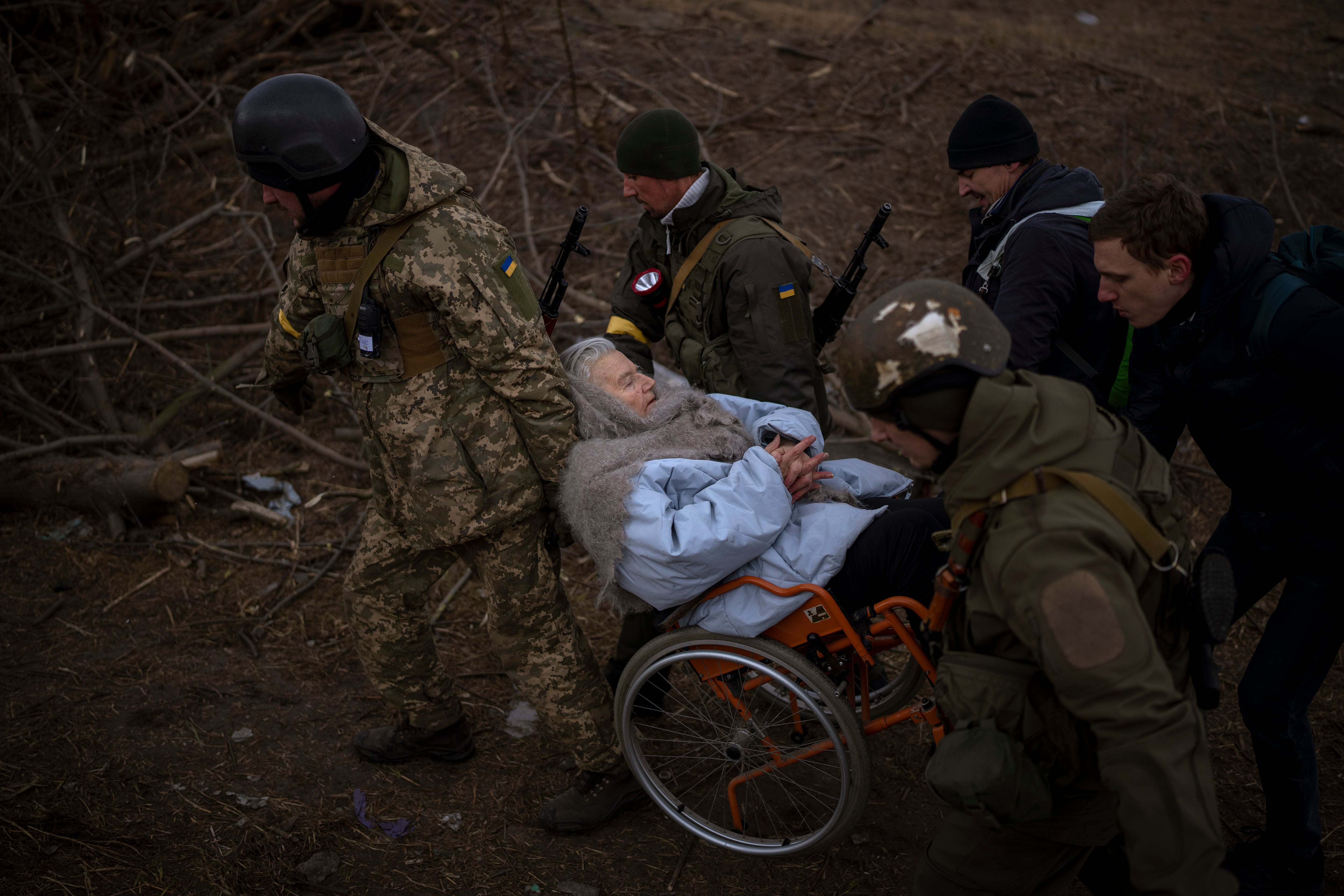
French President Emmanuel Macron also dismissed the plan as a cynical move by Moscow.
“I don’t know many Ukrainians who want to seek refuge in Russia. That’s hypocrisy,” he said in an interview on French news broadcaster LCI.
The Ukrainian government instead proposed eight routes allowing civilians to travel to western regions of Ukraine where there is no shelling.
Earlier, Klitschko said in a Telegram video address that “fierce battles” continued Monday in the Kyiv region, notably around Bucha, Hostomel, Vorzel and Irpin.
In the Irpin area, which has been cut off from electricity, water and heat for three days, witnesses saw at least three tanks Monday and said Russian soldiers were seizing houses and cars.
Russian forces also continued their offensive in Mykolaiv, opening fire on the city some 480 kilometers (300 miles) south of Kyiv, according to Ukraine’s military. Rescuers said they were putting out fires caused by rocket attacks in residential areas.
Emergency officials in the Kharkiv region said overnight shelling killed at least eight people and wrecked residential buildings, medical and education facilities and administrative buildings.
“Russia continues to carry out rocket, bomb and artillery strikes on the cities and settlements of Ukraine,” Ukraine’s General Staff said, repeating accusations that Russia has targeted humanitarian corridors.
Russia has grown increasingly isolated in the face of punishing sanctions. The ruble’s value has plunged, and the country’s extensive business ties with the West have been all but severed.
Moscow has also cracked down on independent reporting on the conflict and arrested anti-war protesters en masse. On Sunday more than 5,000 people in 69 cities were detained, according to rights group OVD-Info — the highest single-day figure since the invasion began.
Ukrainian President Volodymyr Zelenskyy called for more punitive measures, including a global boycott of Russia’s oil exports, which are key to its economy.
“If (Russia) doesn’t want to abide by civilized rules, then they shouldn’t receive goods and services from civilization,” he said in a video address.
Russia’s invasion has nearby countries terrified that the violence could spread.
U.S. Secretary of State Antony Blinken on Monday began a lightning visit to the three Baltic states of Latvia, Lithuania and Estonia, former Soviet republics that are NATO members. Blinken hoped to reassure them of the alliance’s protection.
The West has rushed weapons to Ukraine, but NATO has shown no interest in sending troops into the country and has rejected Zelenskyy’s pleas to establish a no-fly zone for fear that could trigger a wider war.
Yuras Karmanau, The Associated Press. Associated Press reporters from around the world contributed to this report.
China still refuses to condemn Russian invasion
7:23 a.m. EST March 7
The Chinese Foreign Minister on Monday called Russia Beijing’s “most important strategic partner” amid China’s continued refusal to condemn the invasion of Ukraine.
Wang Yi said ties with Moscow constituted “one of the most crucial bilateral relationships in the world.”
China has broken with the U.S., Europe and others that have imposed sanctions on Russia after its invasion of Ukraine. Beijing has said sanctions create new issues and threaten a political settlement of the conflict.
“No matter how perilous the international landscape, we will maintain our strategic focus and promote the development of a comprehensive China-Russia partnership in the new era,” Wang told reporters at a news conference on the sidelines of the annual meeting of China’s ceremonial parliament.
“The friendship between the two peoples is iron clad,” he added.
Much attention has been paid to a meeting between Chinese leader Xi Jinping and President Vladimir Putin in Beijing on Feb. 4, after which a joint statement was issued affirming “strong mutual support for the protection of their core interests.”
Russia endorsed China’s view of self-governing Taiwan as an “inalienable part of China, and opposes any forms of independence of Taiwan,” while China backed Russia in opposing the further enlargement of NATO.
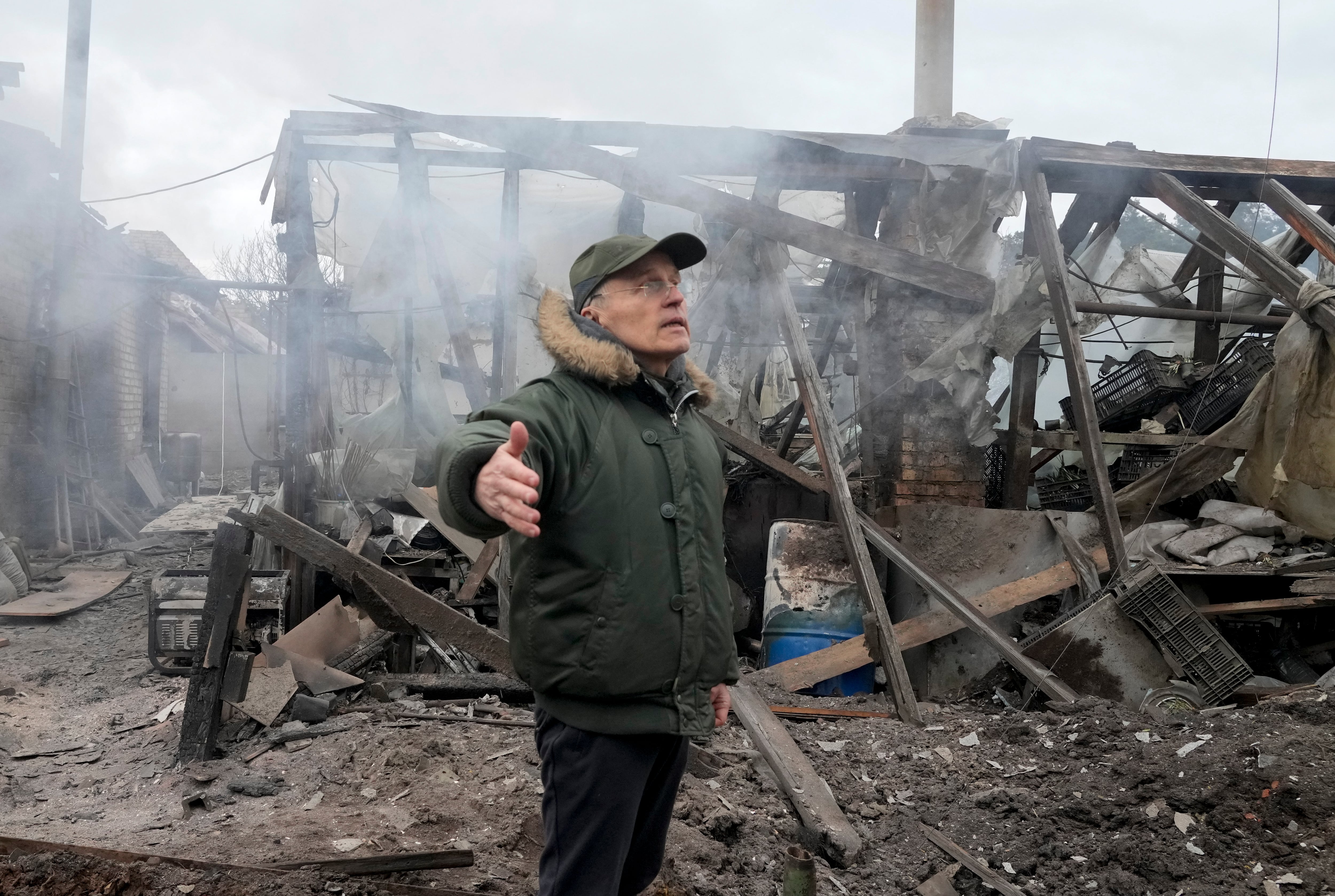
Russia’s invasion of Ukraine has drawn comparisons to China’s own threat to invade Taiwan in order to bring what it considers a wayward province under its control.
However, Wang said Taiwan was a “fundamentally different” issue from Ukraine because the island is “an inalienable part of China’s territory.”
“Some people, while being vocal about the principle of sovereignty on the Ukraine issue, have kept undermining China’s sovereignty and territorial integrity on the Taiwan question. This is a blatant double standards,” Wang said in a less-than-subtle dig at Taiwan’s ally, the U.S.
China and Russia have increasingly aligned their foreign policies against the liberal Western order and their militaries have carried out exercises together and flown joint air patrols, as their relationship has taken on the trappings of an informal alliance.
Xi’s government has refused to criticize the Russian invasion but tried to distance itself from Putin’s war by calling for dialogue and the respect of national sovereignty. That prompted suggestions Putin failed to tell the Chinese leader his plans before their February statement.
Along with denouncing trade and financial sanctions on Moscow, Beijing says Washington is to blame for the conflict for failing to take Russia’s security concerns into consideration.
During an hour-long phone conversation with U.S. Secretary of State Antony Blinken on Saturday, Wang said China opposes any moves that “add fuel to the flames” in Ukraine.
Wang called for negotiations to resolve the immediate crisis, as well as talks on creating a balanced European security mechanism. He said the U.S. and Europe should pay attention to the negative impact of NATO’s eastward expansion on Russia’s security.
On a visit to the Lithuanian capital of Vilnius on Monday, Blinken said China’s actions were at odds with its avowed support for stability and “respecting sovereignty.”
Blinken was speaking at a joint news conference with his Lithuanian counterpart, whose country has come under severe economic pressure from Beijing after it agreed to allow Taiwan to open a de-facto embassy in Vilnius
“From its coercion of Vilnius to its failure thus far to condemn Moscow’s flagrant violation of the sovereignty and territorial integrity of Ukraine today and in 2014, Beijing’s actions are speaking much louder than its words,” he said, referring to Russia’s earlier annexation of Crimea.
Chinese state-controlled media outlets have been told to post only pro-Russian content and to censor anti-Russian or pro-Western views, according to a copy of instructions that appeared on the social media account of the newspaper Beijing News. The post was later deleted.
On Friday, a translation by state TV of remarks by the head of the International Paralympic Committee during the opening ceremony of the Beijing Winter Paralympics skipped portions that expressed horror about the war in Ukraine and called for peace.
Online and in Chinese social media, expressions of sympathy for Ukraine and support for Russia appear but not criticism of Moscow.
The state-run newspaper Capital News appeared to support Putin’s demand that Ukraine become a neutral buffer between Russia and Europe and give up the possibility of NATO membership.
“Ukraine should be a bridge between East and West, rather than a frontier of confrontation between major powers,” Capital News said.
The most senior Chinese leaders have avoided mentioning the war in public.
On Saturday, Premier Li Keqiang, the No. 2 leader, indirectly acknowledged its impact, saying prices of oil, wheat and other commodities are high and “prone to fluctuation,” but gave no indication why.
Global conditions, Li said, were “increasingly volatile.”
-Ken Moritsugu, The Associated Press
“Fastest growing refugee crisis in Europe since WW II”
6:03 a.m. EST March 7
Russia announced yet another cease-fire and a handful of humanitarian corridors to allow civilians to flee Ukraine starting Monday, but previous such measures have fallen apart and Moscow’s armed forces continued to pummel some Ukrainian cities with rockets even after the announcement.
A day earlier, hundreds of thousands of civilians attempting to flee to safety were forced to shelter from what Ukrainian officials said was Russian shelling in cities in the center, north and south.
Ahead of a third round of talks planned for Monday, the Russian Defense Ministry said a cease-fire would start in the morning, and safe passages would open for civilians from the capital of Kyiv, the southern port city of Mariupol, and the cities of Kharkiv and Sumy. Some of the evacuation routes, however, would funnel civilians toward Russia or its ally Belarus — unlikely destinations for many Ukrainians who would prefer to head toward countries on the western and southern borders.
A senior Ukrainian official rejected those proposals.
It wasn’t immediately clear if fighting would stop beyond the areas mentioned or when the cease-fire would end. Hopes were dim that the latest round of talks would yield any breakthroughs.
Well into the second week of war, Russia’s plan to quickly overrun the country has been stymied by fierce resistance. Its troops have made significant advances in southern Ukraine and along the coast, but many of its efforts have become stalled, including an immense military convoy that has been almost motionless for days north of Kyiv.
The fighting has sent energy prices surging worldwide, stocks plummeting, and is threatening the food supply and livelihoods of people around the world who rely on farmland in the Black Sea region.
The death toll from the fighting, meanwhile, remains unclear. The U.N. says it has confirmed just a few hundred civilian deaths but also warned that the number is a vast undercount. Police for the Kharkiv region said Monday that 209 people have died there alone — 133 of them civilians.
The Russian invasion has also pushed 1.5 million people to flee the country, creating what the head of the U.N. refugee agency called “the fastest-growing refugee crisis in Europe since World War II.”
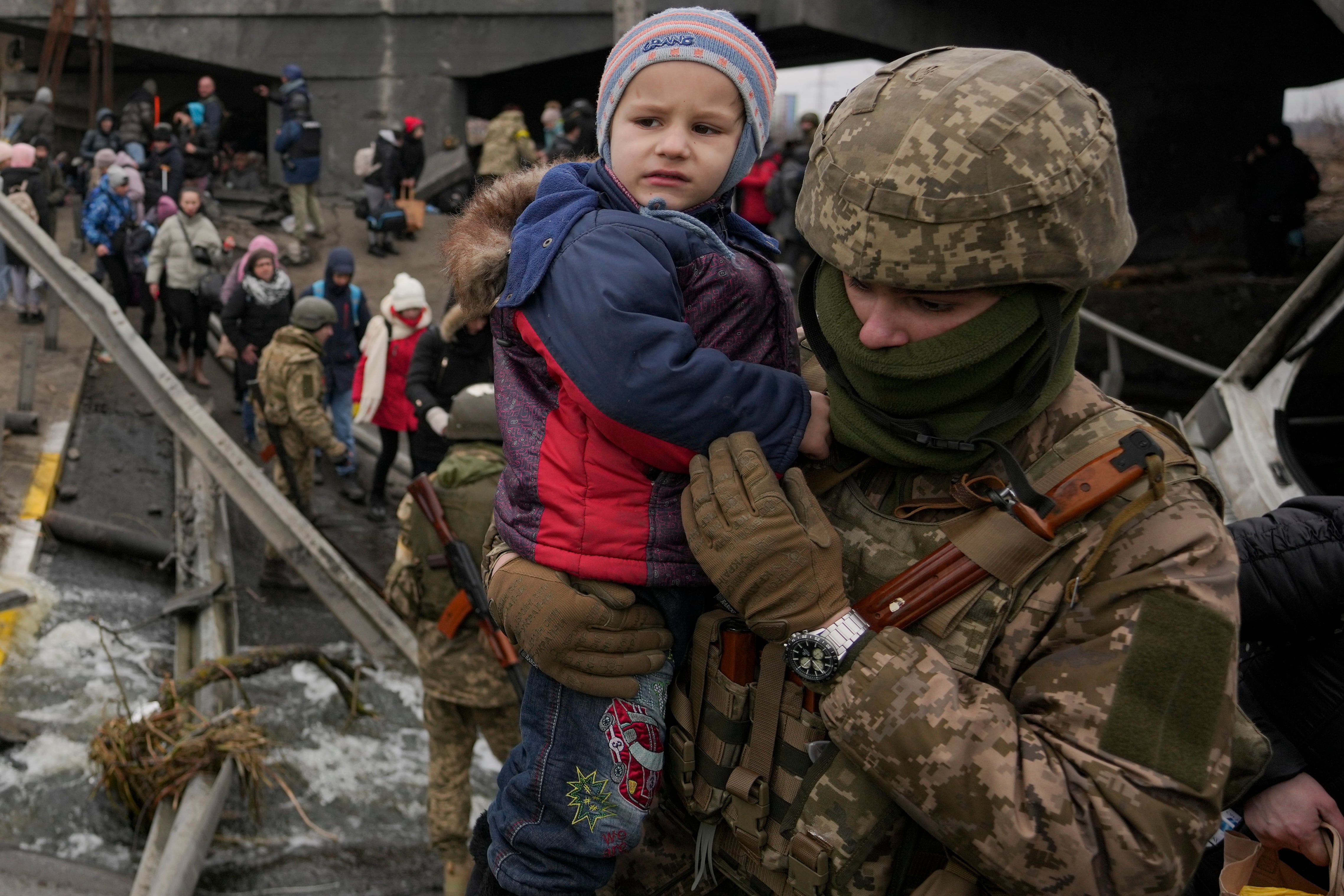
But many others have become trapped in cities under fire. Food, water, medicine and almost all other supplies were in desperately short supply in the southern port city of Mariupol, which an estimated 200,000 people are trying to flee but where an earlier cease-fire collapses. Russia and Ukraine have traded blame for the failure.
The Russian task force said the new pledge for humanitarian corridors was announced at the request of French President Emmanuel Macron, who spoke to Russian President Vladimir Putin on Sunday. Macron’s office said he asked for a broader end to military operations in Ukraine and protections for civilians.
Ukrainian Deputy Prime Minister Irina Vereshchuk called the proposed evacuation routes to Russia and Belarus “unacceptable.” Belarus is a key ally of Putin and served as a launching ground for the invasion.
The Ukrainian government is proposing eight humanitarian corridors, including from Mariupol, that would allow civilians to travel to the western regions of Ukraine where there is no Russian shelling.
“Providing evacuation routes into the arms of the country that is currently destroying yours is a nonsense,” said U.K. Europe Minister James Cleverly.
The Russian proposal was reminiscent of similar ones in Syria. In 2016, a joint Russian and Syrian proposal to set up humanitarian corridors out of besieged opposition-held eastern Aleppo was deeply criticized on humanitarian grounds. Human rights activists said the tactic, coupled by brutal sieges, effectively gave residents a choice between fleeing into the arms of their attackers or dying under bombardment.
Meanwhile, Russian forces continued their offensive, opening fire on the city of Mykolaiv, 480 kilometers (300 miles) south of the capital, according to Ukraine’s General Staff. Rescuers said they were putting out fires in residential areas caused by rocket attacks.
Emergency officials in the Kharkiv region said that overnight shelling killed at least eight people and wrecked residential buildings, medical and education facilities and administrative buildings.
Shelling also continued in the suburbs of Kyiv, including Irpin, which has been cut off from electricity, water and heating for three days.
“Russia continues to carry out rocket, bomb and artillery strikes on the cities and settlements of Ukraine,” the General Staff said.
The General Staff also repeated earlier Ukrainian accusations that the Russians have targeted humanitarian corridors. The statement also accused Russian forces of taking women and children hostage and placing weapons in residential areas of cities — though it did not elaborate or provide evidence.
“Instead of humanitarian corridors, they can only make bloody ones,” Ukrainian President Volodymyr Zelenskyy said Sunday. “Today a family was killed in Irpin. Man, woman and two children. Right on the road. As in a shooting gallery.”
Putin earlier said Moscow’s attacks could be halted “only if Kyiv ceases hostilities.” As he has often done, Putin blamed Ukraine for the war, telling Turkish President Recep Tayyip Erdogan on Sunday that Kyiv needed to stop all hostilities and fulfill “the well-known demands of Russia.”
Putin launched his invasion with a string of false accusations against Kyiv, including that it is led by neo-Nazis intent on undermining Russia with the development of nuclear weapons.
As Russian attacks worsened, a brief reprieve from fighting in Mariupol collapsed. Heavy artillery hit residential areas in other large cities, local officials reported.
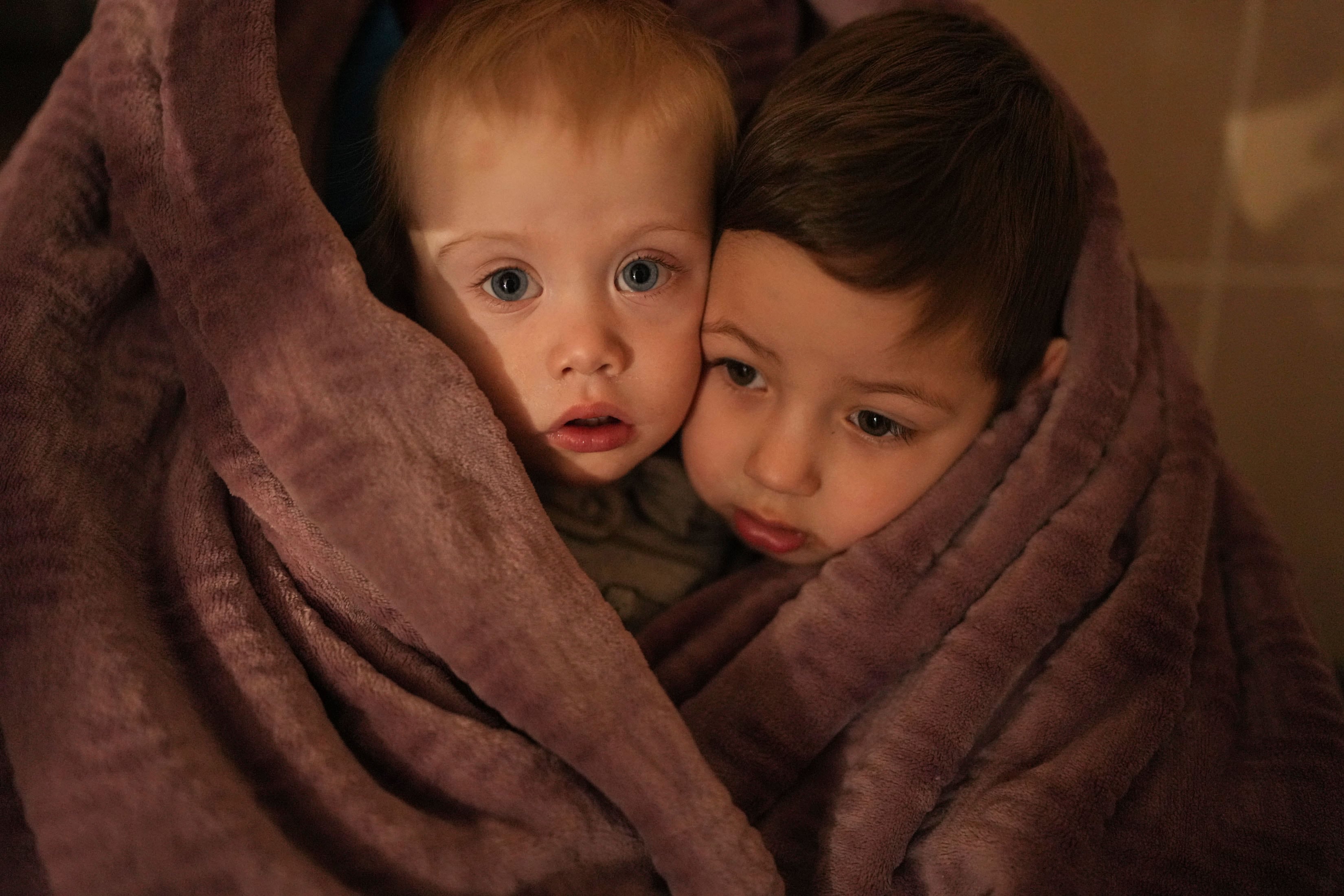
“There can be no ‘green corridors’ because only the sick brain of the Russians decides when to start shooting and at whom,” Ukrainian Interior Ministry adviser Anton Gerashchenko said on Telegram.
On what is known as Forgiveness Sunday in Orthodox Christianity, Zelenskyy said Ukraine will never forgive the shelling of its homes, the killing of unarmed people and the destruction of its infrastructure.
“And God will not forgive, either today or tomorrow — never. And instead of a day of forgiveness, there will be a judgment day. Of this I am sure,” he said in a video address.
His adviser, Oleksiy Arestovich, described a “catastrophic” situation in the Kyiv suburbs of Bucha, Hostomel and Irpin, where efforts to evacuate residents on Sunday failed. About eight civilians were killed by Russian shelling in Irpin, according to Mayor Oleksander Markyshin.
Video footage showed a shell slamming into a city street, not far from a bridge used by people fleeing the fighting.
British military officials compared Russia’s tactics to those Moscow used in Chechnya and Syria, where surrounded cities were pulverized by airstrikes and artillery.
“This is likely to represent an effort to break Ukrainian morale,” the U.K. Ministry of Defense said.
The handful of residents who managed to flee Mariupol before the humanitarian corridor closed said the city of 430,000 had been devastated.
“We saw everything: houses burning, all the people sitting in basements,” said Yelena Zamay, who fled to one of the self-proclaimed republics in eastern Ukraine held by pro-Russian separatists. “No communication, no water, no gas, no light, no water. There was nothing.”
Russia has made significant advances in southern Ukraine as it seeks to block access to the Sea of Azov. Capturing Mariupol could allow Moscow to establish a land corridor to Crimea, which Russia annexed from Ukraine in 2014 in a move that most other countries considered illegal.
But much of the Russian advance has become stalled, including an immense military convoy north of Kyiv.
A senior US defense official said Sunday that the U.S. assesses that about 95% of the Russian forces that had been arrayed around Ukraine are now inside the country. The official, who spoke on condition of anonymity to discuss military assessments, said Russian forces continue to advance in an attempt to isolate Kyiv, Kharkhiv and Chernihiv, but are being met with strong Ukrainian resistance.
The West has broadly backed Ukraine, offering aid and weapon shipments and slapping Russia with vast sanctions. But no NATO troops have been sent to Ukraine.
Zelenskyy has heaped criticism on Western leaders for not responding with more force to Russia. He reiterated a request for foreign forces to impose a no-fly zone over Ukraine, which NATO so far has ruled out because of concerns such an action would lead to a far wider war.
Zelenskyy also asked the United States and NATO countries to send more warplanes to Ukraine and for more sanctions against Russia.
Russia has become increasingly isolated in the days since the invasion began, as sanctions forced dozens of multinational companies to end or scale back their work in the country and Moscow dramatically restricted independent reporting on the conflict. The ruble has plunged in value, and Russia’s extensive trade ties with the West have been all but severed.
-Yuras Karmanau, The Associated Press. Associated Press reporters from around the world contributed to this report.





